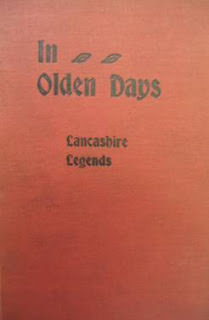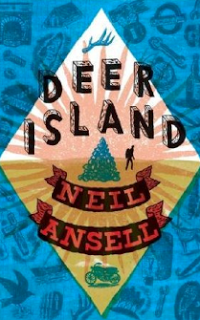Brian Clegg's Blog, page 116
June 26, 2013
Shaping the past
In my project to scan all my old photos I have just come across this little number from circa 1917.

Before anyone adds a sarcastic comment I should add that I was not around in 1917, but the picture is of great interest to me as the young lady reclining at the front in her exotic harem pants (but jolly sensible shoes) is my grandmother, Annie Clegg (though at the time Annie Pickersgill, as my grandad was still just her sweetheart, fighting in the First World War).
 This is some sort of pageant organized by the local vicar, the Reverend Oakley, best known probably for his rather entertaining book of local legends In Old Days, which features the story of the Clegg Hall boggart that I replicate in my article on Clegg Hall.
This is some sort of pageant organized by the local vicar, the Reverend Oakley, best known probably for his rather entertaining book of local legends In Old Days, which features the story of the Clegg Hall boggart that I replicate in my article on Clegg Hall.
I don't have any great observations or wise words about this photo - but I find it fascinating, not just in terms of my seeing my grandma in a whole new light, but those others. What became of them? Are their families still in the area? What kind of lives did these girls on the edge of becoming women have?
I hope they were happy ones.

Before anyone adds a sarcastic comment I should add that I was not around in 1917, but the picture is of great interest to me as the young lady reclining at the front in her exotic harem pants (but jolly sensible shoes) is my grandmother, Annie Clegg (though at the time Annie Pickersgill, as my grandad was still just her sweetheart, fighting in the First World War).
 This is some sort of pageant organized by the local vicar, the Reverend Oakley, best known probably for his rather entertaining book of local legends In Old Days, which features the story of the Clegg Hall boggart that I replicate in my article on Clegg Hall.
This is some sort of pageant organized by the local vicar, the Reverend Oakley, best known probably for his rather entertaining book of local legends In Old Days, which features the story of the Clegg Hall boggart that I replicate in my article on Clegg Hall. I don't have any great observations or wise words about this photo - but I find it fascinating, not just in terms of my seeing my grandma in a whole new light, but those others. What became of them? Are their families still in the area? What kind of lives did these girls on the edge of becoming women have?
I hope they were happy ones.
Published on June 26, 2013 01:08
June 25, 2013
The plans are on display
 One of the best bits of The Hitchiker's Guide to the Galaxy (and there are, indeed, many best bits) involves the development plans that result in the demolition of Arthur Dent's house. When he complains, he is told the plans have been on display for the last nine months. Yes, points out Arthur, they were in the cellar, which had no lights or stairs, in the bottom of a locked filing cabinet stuck in a disused lavatory with a sign on the door saying 'Beware of the Leopard'.
One of the best bits of The Hitchiker's Guide to the Galaxy (and there are, indeed, many best bits) involves the development plans that result in the demolition of Arthur Dent's house. When he complains, he is told the plans have been on display for the last nine months. Yes, points out Arthur, they were in the cellar, which had no lights or stairs, in the bottom of a locked filing cabinet stuck in a disused lavatory with a sign on the door saying 'Beware of the Leopard'.I felt something of this coming back to me when I decided to follow up just what was going on with the form I was kindly sent by the 'World Trade Register' for my company to be listed on their website.
The form kindly tells me that 'Updating is free of charge', and I should only sign if I want to place an insertion. Okay, what does that actually mean? There is no mention on the form of any charges incurred if I do sign, but in the small print it tells me that signing the document means I accept the terms and conditions on their web page.
Okay, I like a challenge. So I went to the web page and sure enough I am told that 'by sending an order the customer accepts these terms' (though the signature part isn't mentioned here) and that they will be invoiced if they don't cancel in 7 days. Yes, an invoice. Because updating may be free of charge, but inserting certaining isn't. How much does it cost? Go down a few paragraphs and it is casually mentioned that the insertion fee for the first 3 years is €2,985. That's about £2,500 or $4,000. Not a bad profit for listing someone in a register.
Of course, this may be all of huge value to the companies in question, though it would make a very interesting business case. But what is without doubt is that the 'Updating is free of charge' (the only print in that section in bold, and the only statement in the covering email about charges) is at best misleading, and the indirect route via the small print to the terms and conditions page on the website is not what you might call the most transparent bit of pricing.
Somehow I don't think I will be signing up.
Published on June 25, 2013 00:38
June 24, 2013
What does 'live' mean to us?
 The Thursday before last I went to see a play that was being performed that evening in a London theatre. I was in Swindon. This was the NT Live presentation of The Audience. The play itself was on in London, but we were watching it beamed into our local cinema.
The Thursday before last I went to see a play that was being performed that evening in a London theatre. I was in Swindon. This was the NT Live presentation of The Audience. The play itself was on in London, but we were watching it beamed into our local cinema.I have to say, the experience was excellent. The play was very good and the visuals were excellent. They even had programmes, not to mention wine and beer for sale in the interval. And the staff were unusually attentive as we went out more like... well, a theatre than the local multiplex. So many thanks to Joe and Sarah for organizing it, as we would have never have got round to it.
It got me to thinking about the nature of seeing something live. With some kind of events, there is definitely something special about seeing it live, even if it is via a video link. It was interesting that someone I know online saw the same production from a cinema on the Isle of Man - and I had a real sense of shared experience, far more than if we had both just watched something on the TV. I think it is the immediacy and more real-feeling aspect of the location. Being in a cinema is a lot more like being in a theatre than sitting on the couch at home.
Increasingly I tend not to watch TV shows truly live. I'd say around 75 per cent of my viewing is either timeshifted using a PVR or streamed from Netflix. And that's fine. But there is something special about truly watching it live. The idea that it really is unfolding in front of you. Even the possibility that something could go wrong as you watch. It is why at the tender age of 14 I stayed up all night to watch the Moon landing. You just had to be there.
Once upon a time, 'being there' was cut and dried. Either you were there or you weren't. End of story. Now it is a continuum. There is really being there, there is being there in the sense that we were there at the performance of The Audience, there is being there live on TV and there is being there in a recorded TV broadcast.
Of course really being there is often best. If you take Wimbledon, for instance, the actual view is much better on TV, but I remember my only time at the real thing, seeing Jimmy Connors in his last ever semi-final, far more than anything I've ever seen on screen. But there is no doubt that with events like NT Live we are making it a lot easier to almost be there where it's not practical to do the real thing. And we got home by 10pm without an immense hole in the wallet. What's not to love?
Published on June 24, 2013 00:25
June 22, 2013
BBC lunacy - official
 The Supermoon will not look like this. Unless you
The Supermoon will not look like this. Unless youhave a telescope. In which case, any full moon could
look like this.Yes, the BBC's science correspondents are lunatics - and it's not only the BBC that I accuse (in the original sense of the word 'lunatic' - driven bonkers by the influence of the moon). For once again we are bombarded with 'news' about the Supermoon tomorrow when, yes, it will be a teensy bit brighter than it was last night.
The night sky is set to be illuminated later by what will appear to be a much bigger and brighter Moon , screams the BBC tagline. Well, no, it won't. This is misuse of statistics, but those stats just happen to be hidden beneath weasel terms like 'much bigger' and 'much brighter'.
First of all, we have to ask 'much bigger' and 'much brighter' than what? The obvious comparison is with the night before, and I can confidently predict that the difference will be unnoticeable. But let's go all the way and compare the Moon's appearance this weekend with the way it is at its most distant and dimmest, because of course we can all remember what it looked like months ago. According to the BBC article, it will be 14% brighter than when it is at its furthest away. That sounds a lot, right? Let's compare with light bulbs. The light output of a bulb does not have a linear relationship with the power, but I have calculated that a 66 watt bulb is roughly 14% brighter than a 60 watt bulb. That's the kind of difference we are looking at.
Even more dramatic is the website's claim that the Moon will seem '30% bigger'. Of course this is a meaningless statistic as it doesn't define what is bigger, but let's assume this is the increase in area, as that sound more dramatic than the increase in diameter, and they are bound to use the most dramatic figure to add, erm, a sense of drama to a totally uninteresting event. The apparent diameter of the Moon is about the same as a 5mm punched hole held at arm's length. (Sounds ridiculously small? That's your amazing brain, fooling you.) To produce a 30% increase in area requires a 14% increase in diameter. So assuming my 5mm is the average between Supermoon and Weeniemoon, we are looking at around an apparent diameter of the Moon of the equivalent of about 5.3mm at arm's length at its biggest. Whoopie-doo.
The article compounds confusion by talking about the psychological effect that makes the Moon look much bigger than it really is when it is close to the horizon, trees or buildings as if this is an effect of the Supermoon, rather than something that happens whenever we see the Moon. Groan and double groan.
Altogether an appalling bit of work of which the BBC should be ashamed. They say 'We'd like to see your pictures of the supermoon' as if anyone could tell the difference between them and pictures of any other full moon.
Sadly, even properly scientific sources are going a bit bonkers over this, trying to get their moment in the spotlight (or Supermoonlight). Stop being naughty, people. It's a small effect of very little significance. Tell us some real science.
Image from Wikipedia
Published on June 22, 2013 06:46
June 21, 2013
Contactless missed a trick
 My trusty Oyster cardI haven't used contactless payment cards much. This isn't an aversion to using new technology - I love it - or worries about the security, it's just that the only contactless bank card I've got at the moment is a credit card and I pay for most things with a debit card. But seeing it in action the other day made me think that those rolling out the technology have (perhaps because of a vested interest) missed a big trick.
My trusty Oyster cardI haven't used contactless payment cards much. This isn't an aversion to using new technology - I love it - or worries about the security, it's just that the only contactless bank card I've got at the moment is a credit card and I pay for most things with a debit card. But seeing it in action the other day made me think that those rolling out the technology have (perhaps because of a vested interest) missed a big trick.Like many others, even though I don't live in London, I have an Oyster card, the contactless payment method that is the most convenient way to use London Transport. It's a card you load up, then use - so effectively an electronic cash wallet. And it struck me, why don't contactless payment devices accept Oyster cards? It's the same technology, and with a bit of inter-connection on the back end so it could access your Oyster account, the card would become a cashless payment wallet. Great, for instance, to give to children with no danger of over-spending.
We have some experience of this in Swindon. When I first arrived here it was on the tail end of the trial of Mondex, one of the first large scale trials of a cashless payment system. Even though I was late to the game, I relished it. But Oyster would have huge advantages over Mondex in the way it is already well established in London, and with the flood of contactless payment terminals that is spreading through the land. (Contactless payment for car parks next, please, guys.)
For that matter, the Oyster system would be much better if it accepted contactless debit and credit card payments too, but that would be a bigger infrastructure change. Getting Oyster cards accepted as cashless wallets seems to me a much more practical possibility.
How about it?
Published on June 21, 2013 00:23
June 20, 2013
Bloomsday doomsday
 The shrine of the literary trainspotterI gather Sunday, apart from being Father's Day, was also 'Bloomsday' the day when James Joyce fans with nothing better to do celebrate their master's work.
The shrine of the literary trainspotterI gather Sunday, apart from being Father's Day, was also 'Bloomsday' the day when James Joyce fans with nothing better to do celebrate their master's work.You might suspect that I am not among their number - and you would be right. I have had a couple of attempts at reading Joyce and failed miserably. In part it is because I absolutely hate stream of consciousness. I have never, ever seen it work acceptably. It is just boring . But also because, while I am prepared to put some effort into reading a book - I don't expect it all to be effortless page-turning - I do expect the author to have some expertise in putting information across, and, frankly, I think Joyce is terrible at it.
This is rather similar to my beef with the kind of artists where it is impossible to appreciate their work without an instruction book. Art should communicate. If you need help to understand it, it is bad art. It might take time for the language to be fully understood (think of the iffy reception the likes of Beethoven had early on), but the viewers/listeners should be able to get there on their own.
To me, being a Joyce fan is a bit like being a trainspotter or a mountain climber. (As far as I am concerned they are basically both people who like to tick things off in their little books, mental or otherwise. It's just the trainspotters have found a way to do it where you don't risk your life and you can drink a flask of tea at the same time. We won't mention anoraks.) Reading Joyce is about patting yourself on the back for having managed to achieve the feat, but you don't get photos of yourself on the summit to bore your friends with.
Let's be clear. I have nothing against mountain climbers or trainspotters. But I think we need to put Joyce into proportion - and making the comparison helps clarify things for me.
Published on June 20, 2013 00:40
June 19, 2013
Why I am not impressed by a lot of flying saucer photos
A while ago I reviewed a book of UFO photos, commenting that I had severe doubts about the images, partly because a fair number of them were very similar to the fakes I used to do in my youth (just for fun).
I commented 'One of the problems with the hubcap technique is that it tended to fly, and so to be photographed, at an unnatural angle – yet time after time these “unexplained and inexplicable” shots in the book are of fuzzy, out of focus hubcap-like objects at the same kind of angle as I found so irritating when I tried to fake my pictures.'

I am gradually scanning in my old photos and have just found a couple of these hubcap style photos (this was actually a metal camping plate). They were taken over Aviemore in Scotland in a very high wind that meant if you threw the plate against the wind it would hover extremely impressively.

This is clearly a real saucer because it is hovering in the same position in two separate photos, just at a slightly different angle. This was intentionally done, using the mound the person is standing on in the second image as a reference point. Note also that it was clearly there a long time, as the first shot is in early dawn light and the second much later. (Actually they were minutes apart, that's a bit of cheeky post-processing.)
 Here is the traditional much-too-blown-up shot from the image above. If this was in a UFO book we would be asked to note the clear pyramid-shaped lighter coloured propulsion unit beneath, the suggestion of a superstructure above the saucer, and the way the drive field is distorting the air around it.
Here is the traditional much-too-blown-up shot from the image above. If this was in a UFO book we would be asked to note the clear pyramid-shaped lighter coloured propulsion unit beneath, the suggestion of a superstructure above the saucer, and the way the drive field is distorting the air around it.
No, it is just a tin plate, throw frisby-style into the wind.
I commented 'One of the problems with the hubcap technique is that it tended to fly, and so to be photographed, at an unnatural angle – yet time after time these “unexplained and inexplicable” shots in the book are of fuzzy, out of focus hubcap-like objects at the same kind of angle as I found so irritating when I tried to fake my pictures.'

I am gradually scanning in my old photos and have just found a couple of these hubcap style photos (this was actually a metal camping plate). They were taken over Aviemore in Scotland in a very high wind that meant if you threw the plate against the wind it would hover extremely impressively.

This is clearly a real saucer because it is hovering in the same position in two separate photos, just at a slightly different angle. This was intentionally done, using the mound the person is standing on in the second image as a reference point. Note also that it was clearly there a long time, as the first shot is in early dawn light and the second much later. (Actually they were minutes apart, that's a bit of cheeky post-processing.)
 Here is the traditional much-too-blown-up shot from the image above. If this was in a UFO book we would be asked to note the clear pyramid-shaped lighter coloured propulsion unit beneath, the suggestion of a superstructure above the saucer, and the way the drive field is distorting the air around it.
Here is the traditional much-too-blown-up shot from the image above. If this was in a UFO book we would be asked to note the clear pyramid-shaped lighter coloured propulsion unit beneath, the suggestion of a superstructure above the saucer, and the way the drive field is distorting the air around it. No, it is just a tin plate, throw frisby-style into the wind.
Published on June 19, 2013 00:42
June 17, 2013
Of agnostics and unicorns
 I am not agnostic about this. It is a horse with
I am not agnostic about this. It is a horse witha narwhal tusk as a rather showy bit of blingEvery now and then the hoary business of religion and science rears its head. I am generally quite happy with Stephen Jay Gould's concept of non-overlapping magisteria, and if we stuck to that we'd have a lot less bickering (and hopefully hear a lot less from Richard Dawkins), but I made the mistake of commenting on a Facebook post after someone was promoting atheism as the best scientific viewpoint. I retorted that I thought the only true scientific viewpoint was agnosticism. (This doesn't mean, by that way, that scientists can't be believers or atheists - merely that when they do so, they are not being scientific. NOMa.)
I got a kick-back moaning that you couldn't be agnostic about god, and if you did, you might as well be agnostic about unicorns. This irritated me and I made a rather snippy remark, asking if they knew what 'agnosticism' means. The dictionary definition of agnostic is 'A person who believes that nothing is known or can be known of immaterial things, especially of the existence or nature of God' - so to say you can't be agnostic about God doesn't make a lot of sense, because it is inherent in the definition of the word.
In fact, the comparison with unicorns misses the point. I believe that sloths exist, even though I have never seen one, based on indirect evidence. I similarly believe that unicorns don't exist based on a total absence of evidence. Although as they (irritatingly) say, absence of evidence is not evidence of absence, we would expect there to be some physical evidence of unicorns because they are supposed to be physical creatures. But we don't.
God is a whole different ballgame, and the proper comparison would be an invisible dragon in my garage that does not trigger any kind of sensor, not a unicorn. As these are hypothetical non-physical entities, the absence of physical evidence is clearly not enough to establish non-existence of either God or the dragon. So the starting point really ought to be agnosticism. In principle I am agnostic about the existence of invisible, undetectable dragons. But I tend towards atheism on the matter of there being an invisible dragon in my garage, because no one is making this claim. Certainly not me.
There is a difference of scale, though, between God and the dragon. Billions of people claim that God exists. This doesn't make it true. Lots of people used to think the Sun went around the Earth. Lots of people still believe the Earth was created in 4004 BC. There is good evidence they are wrong on both counts. But the point is that there is no evidence that the God believers are wrong - merely absence of evidence that they are right. And this being the case, I genuinely believe that agnosticism is the only scientific view to take.
If you want to tell me there is an invisible dragon in your garage, and you genuinely believe this to be true, then I am happy to be agnostic about that too.
Image from Wikipedia
Published on June 17, 2013 23:44
Deer Island
 This is a book I would never have read if I hadn't met the author in a writers' forum, but I am very glad I did. It is way outside the classifications I generally read. In fact it is probably outside classification altogether. It is a sort of social issues/nature memoir.
This is a book I would never have read if I hadn't met the author in a writers' forum, but I am very glad I did. It is way outside the classifications I generally read. In fact it is probably outside classification altogether. It is a sort of social issues/nature memoir.Realistically, the author's life experience is way outside mine. Leaving aside the two main topics of the book, in the intermission, as it were, he is riding an ancient motorbike around the far North of the UK with his Swedish girlfriend. In a rough Scottish town he is told to keep his voice down as it's a rough place and if he were noticed it would be provocative. He comments he had often been told this - in Belfast, Harlem and Bogotà. How unlike the home life of our own dear Queen. Or for that matter, most of us dear readers.
If, like me, you find flowery descriptions of nature off-putting, don't be thrown by the introduction - like the Hitchhiker's Guide to the Galaxy which famously begins ('Space is big. Really big. You just won’t believe how vastly hugely mindbogglingly big it is. I mean you may think it’s a long way down the road to the chemist’s, but that’s just peanuts to space.') after a while it settles down.
The main thrust of the book alternates between life pretty much down but not out in London and life in semi-paradise on the Hebridean island of Jura. The London segments are the more gripping - one working with a charity for the homeless and the other as a squatter in a building with what starts as a quite a gentle experience but goes down hill over the year the author was there. I can relate slightly to the first of these - it reminds me in some ways of my time as a volunteer with a rather down-at-heel branch of the Samaritans - but the second is scarily alien.
Then there is Jura, twice visited, so different in character from the city. This I find much easier to relate to. The author mentions hitchiking a lot elsewhere, and when his bike broke down on Jura on the first visit, he and his girlfriend had to hitch to the village. I have never hitched in my life, I am far too wary. But when I spent 2 weeks on the next island out from Jura, Colonsay, it was notable if ever you walked along the road, every passing car would stop and ask if you wanted a lift. You didn't hitch a ride, they hitched a passenger.
This is a short book - if it had been fiction, it would be a novella - and you can read it in afternoon. It left me wanting more, and having read it, I suspect I will savour it much longer.
You can find out more/buy Deer Island at Amazon.co.uk here, and at Amazon.com here.
Published on June 17, 2013 00:52
June 14, 2013
Science is not my friend
Now look, I am all in favour of this science thing. I spend my time telling people how good it is, and writing about its wonders. So you would think that in return it could at least behave itself. But no. It has to go and show itself up for the spoiled brat of an intellectual field that it is. It's all a matter of carnations.
 Go red, you horrors!
Go red, you horrors!
In my role of occasional domestic lab assistant I was asked to prepare a classic 'carnations with food dye to demonstrate osmosis' jobby. No worries. I did it all by the book. Fresh flowers? Check. Newly cut diagonally under water to prevent air bubbles? Check. Warm but not hot water? Check. Ten to twenty drops of food colouring? Check. And three days the later the little horrors have not taken on a hint of colour.
My suspicion is that they are now treating flowers to make them last longer out of water without wilting with something that prevents or at least reduces their ability to take in water. But that's not the point. This is science. Repeatability is everything. I have been let down.
On a more serious note, it demonstrates how a small variation in materials/initial conditions can be disastrous in terms of outcome - and this does make you wonder just how many real science experiments, with much more complicated setups, have elements in their construction that the scientists aren't aware of that could introduce a variation in output. Could a new type of oil on some minor component in ALICE produce a different result for the LHC? I doubt it, but can we be certain?
Last year's brief 'neutrinos go faster than light' shock demonstrated that it is entirely possible in one of these big experiments for a small aspect that doesn't seem central to the measurement to totally throw the results, just like my carnations.
Of course it's not really science I have a problem with, it is our ability to know exactly what we are dealing with when we assemble an experiment. In his fascinating book Time Reborn , Lee Smolin makes the point that we tend to assume our experiments are closed systems. That most fundamental of physical principles, the second law of thermodynamics, only applies to closed systems. Yet, in fact, we have no experience of a true closed system (unless the universe is a closed system, but even that may well not be the case).
There are many ways that closing a system is impossible, but the most obvious one is gravity. We can't exclude the impact of external gravitational forces because we have no way of shielding against gravity. We are just very lucky that gravity is incredibly weak compared with the other physical forces, so on the whole (but not always) we don't have to worry about its impact.
So spare a thought for scientists, whether building an experiment on the desktop or something on the scale of the LHC. They don't just have to get the right equipment together to make their measurements, they have to try to exclude all possible misleading inputs - even when they don't know what they are. There are unknown unknowns, as Donald Rumsfeld might say.
I think I might have to ring CERN for some help with my carnations...
 Go red, you horrors!
Go red, you horrors!In my role of occasional domestic lab assistant I was asked to prepare a classic 'carnations with food dye to demonstrate osmosis' jobby. No worries. I did it all by the book. Fresh flowers? Check. Newly cut diagonally under water to prevent air bubbles? Check. Warm but not hot water? Check. Ten to twenty drops of food colouring? Check. And three days the later the little horrors have not taken on a hint of colour.
My suspicion is that they are now treating flowers to make them last longer out of water without wilting with something that prevents or at least reduces their ability to take in water. But that's not the point. This is science. Repeatability is everything. I have been let down.
On a more serious note, it demonstrates how a small variation in materials/initial conditions can be disastrous in terms of outcome - and this does make you wonder just how many real science experiments, with much more complicated setups, have elements in their construction that the scientists aren't aware of that could introduce a variation in output. Could a new type of oil on some minor component in ALICE produce a different result for the LHC? I doubt it, but can we be certain?
Last year's brief 'neutrinos go faster than light' shock demonstrated that it is entirely possible in one of these big experiments for a small aspect that doesn't seem central to the measurement to totally throw the results, just like my carnations.
Of course it's not really science I have a problem with, it is our ability to know exactly what we are dealing with when we assemble an experiment. In his fascinating book Time Reborn , Lee Smolin makes the point that we tend to assume our experiments are closed systems. That most fundamental of physical principles, the second law of thermodynamics, only applies to closed systems. Yet, in fact, we have no experience of a true closed system (unless the universe is a closed system, but even that may well not be the case).
There are many ways that closing a system is impossible, but the most obvious one is gravity. We can't exclude the impact of external gravitational forces because we have no way of shielding against gravity. We are just very lucky that gravity is incredibly weak compared with the other physical forces, so on the whole (but not always) we don't have to worry about its impact.
So spare a thought for scientists, whether building an experiment on the desktop or something on the scale of the LHC. They don't just have to get the right equipment together to make their measurements, they have to try to exclude all possible misleading inputs - even when they don't know what they are. There are unknown unknowns, as Donald Rumsfeld might say.
I think I might have to ring CERN for some help with my carnations...
Published on June 14, 2013 00:40



